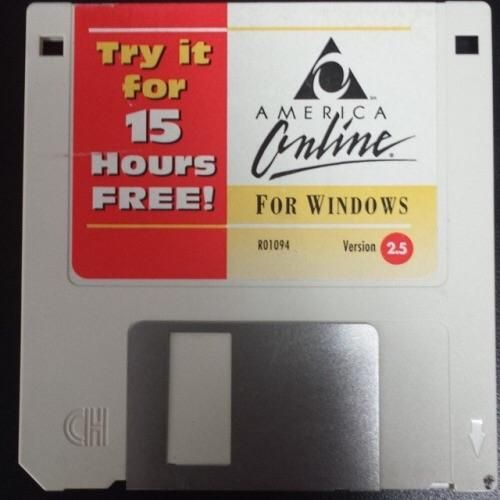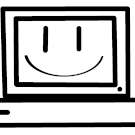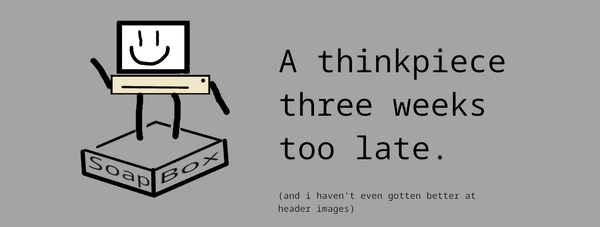Scenes from a Walled Garden

The Web That Was is a collection of memories of the Internet (yes, nerds, technically not just the web) before it consolidated to 4 or 5 websites.
You can learn more about my motivations from this post.
These are mostly a personal retelling of memories and not well-researched information about general topics. If you are looking for something like that, though, https://thehistoryoftheweb.com/ seems like a good resource.
Btw if you want to share some of your own memories, feel free to post 'em to #thewebthatwas.
I was just a wee lad when we got the Internet. I have trouble with my memory at the best of times, so going back all the way is tough. This one is going to require a bit of research to fill in gaps and jog my memory, because I want to go most of the way back.
I think our first ISP was Prodigy ("smack my ISP up"?). But the first Internet experience I actually remember anything about - however vaguely - was good old AOL, America On-Line. We had AOL dial-up Internet for much of my childhood, finally switching to Verizon DSL in...I wanna say 2003?
Back in the day you couldn't go to the mailbox or open a magazine without getting a free trial of AOL, or an ad for a free ISP like NetZero or Juno . Apparently, "at one point, 50% of the CD’s produced worldwide had an AOL logo on it."

AOL was distributed as a client application that offered several "walled garden" type services: news and content portals, email ("you've got mail"), instant messages ("[squeaky door opening sound]"), chat rooms, forums, file libraries. On top of web browsing, via URL or "AOL keyword."

Okay, that's enough context and history. You can read more historical and scientific facts at the outgoing links above if you need more, but otherwise let's get on to some memories. Or parts of memories.
There's probably more here than I would normally shove into a single post, but most are not complete memories or don't have an interesting conclusion, so I decided they could all live together to get them out of the way.
AOL Chat Rooms were not appropriate for children
At least not the ones I remember.
In addition to their famous instant messenger (subject for another post), AOL also offered full-on public chat room experience. A la IRC...or maybe Discord would be a more current reference?
Remember this is AOL, so you aren't joining a Discord full of fellow nerds. Imagine, like, if Facebook suddenly launched a feature where you opened up Messenger were presented with a list of public chat rooms you could join. Maybe there's a better modern analog that I'm just not familiar with - what's Telegram is that something?
Anyway, here's a mildly embarrassing story about my childhood:
As a child, we were often less-than-supervised during after-school hours. My parents both worked. We lived with my grandmother who was usually home, but she wasn't actively checking in on us or anything.
This story takes place I think when I was in 4th or 5th grade, so about 10 years old. 1996? '97, maybe?
I had a few friends in my neighborhood and we would hang out after school, like kids do - or at least did. This might've been riding bikes, playing video games, watching Aliens far younger than we should have...or in this case screwing around on the Internet.
As literal children, AOL's suggested activities for us were somewhat limited. So occasionally, we would pop open the chat rooms list and pick one to drop into.
Presumably there were smaller rooms or rooms that were actually useful or had interesting conversations. We never ended up in those. The rooms we joined always seemed to be constantly scrolling nonsense from people who might as well have been talking to themselves. Maybe we were just slow readers.
You've heard "A/S/L" - Age/Sex/Location? That was AOL chat. A huge portion of the chat was dedicated to people asking and answering that. Oddly, most people seemed to be 18/F/CA(lifornia).
So what are two unsupervised 10 year old boys gonna do in a chat room? We tried a bit of trolling, but the chat always moved too quickly to be very effective and we were too scared to take it to IM with anyone. Which probably was for the best.
So it was on to priority 2: Try to find porn.
Now AOL chat rooms were moderated. Technically. But it never seemed that way to me. I guess the moderators were a group of volunteers who traded their time for power and access. But I don't remember ever running into one directly.
So I don't know if links to porn were technically allowed in chat rooms, but they still popped up fairly regularly. And if they got deleted by mods, it would have been after it had scrolled off the screen. So all we had to do was wait for someone to post a link.
Now looking back, maybe clicking random links in a seemingly-unmoderated chat room wasn't the best idea. But I guess we struck gold eventually and didn't destroy the computer in the process. Different time.
I don't remember any of the specifics of the images we found. So it was either nothing traumatizing, which is good. Or traumatizing enough that my brain has shielded me from it, which I'll also take.
Presumably we spent a bit of time educating ourselves, seeing how what we'd heard on the playground matched or didn't match reality. To quote Lisa Simpson, "as usual, the playground has the facts right but missed the point entirely."
After that, we moved on, newly enlightened. Maybe we started playing Encarta Mind Maze or something.
Like a lot of families in the 90s, the family computer lived centrally in the house so everyone could use it. It moved around the house over the years, but at the time of this story, it lived in "the office." My dad worked in a restaurant and would use the computer when he got home at night, after I was asleep.
Well a few days later, my dad called me into the office to report that he had found pornography on the computer during his weekly search through browser history and cookies. He told me that pornography is disrespectful to women and that women are people and objectifying them is wrong.
And let me tell you: I was shocked, shocked that my friend would look at such harmful material while I was definitely for sure on the other side of the room innocently playing Sonic 3 on Genesis! And I would absolutely have a talk with my friend to let him know that that sort of behavior is unacceptable in our home.
And that's the story of how I learned about browser history and cookies. And how to delete them.
They really just let people upload random files?
I mentioned above that AOL offered "file libraries." I think these were adjacent to the forums feature and allowed users to upload files on the same topic as the forum. Honestly, I'm not sure.
This story, I think, takes place around the same time as the previous one. '96 or '97. No earlier than '95, to be sure. I know this because the N64 was either released or at least would be soon enough that it was showing up in EGM or GamePro or whatever I was reading at the time.
I would peruse the forums and libraries occasionally to see what was going on. I don't know that I ever actively learned anything about computers on there, but it sometimes led to misadventures that ended with me learning something about computers.
Somewhere in some file library, I found a listing for a "C64 Emulator." My mind was reeling. Is this an N64 emulator? Is the C64 some other magical 64-bit system that just hadn't heard of somehow? I did what any other reasonable person would have done in this situation: downloaded and installed it immediately.
At the end of the installer, it asked me to restart my computer. Weird, but alright.
When the computer came back up, it showed me some kind of...weird...blue DOS?
Two pieces of context here:
First, the family computer would have been running Windows 95 or Windows 98 at this time. If you weren't around at the time, these versions of windows ran on top of DOS. If it didn't boot directly into Windows, you may be booting to DOS and running win to start Windows. So being dropped at a command prompt in itself didn't shock me. But how the prompt looked sure did. And that it didn't accept any of the DOS commands I typed into it.
Second, as I've mentioned a few times, this was the family computer. The only computer in the house (we may have had a second one by this time following an upgrade?). If (and when!) I broke this computer, the whole family was out of commission computer-wise until it was fixed. Learning to computer back then was a little scary, cause if you screwed up you aren't just, like, losing your English essay. You're sending your siblings to the library for encyclopedias because they can't use Encarta right now. You're preventing your parents from checking their email.
Anyway, I remember frantically restarting the computer. 5, 6 times. Hoping it would just suddenly be fixed. I remember sitting silently, staring at the C64 prompt, willing myself to spontaneously learn how to use it because with the computer broken I couldn't look it up online. I remember slinking out to the living room, head down and ashamed, asking my parents where the Windows install disk was because I broke the computer.
Unfortunately, while this story does have a happy ending, it doesn't necessarily have a good pay-off. Because I ended up fixing it, but I don't remember how. Some time between me asking my parents about the Windows install disk and them finding it, I figured out...something. I just don't remember what. But the computer was saved.
Being a big fucking dork on IM
AOL offered members FTP access to a directory that could be used to share files or make small websites. There were lots of free website hosting services back then: Tripod, Geocities, and Angelfire (which actually I don't think was free but was popular). We can talk about the other services in another post, because they were quite important. But for now let's chat about what was varyingly known as AOL MyPlace, AOL Member Sites, and AOL Hometown.
As I mentioned, we were spoiled for choice on free or cheap site hosting back in the day, but it was pretty neat to have it offered directly by your ISP. It offered a really easy way to mess around with these technologies. Or, if not literally as easy as a Geocities, at least slightly more convenient since you didn't need an account on a different service. Over the years, I spent a lot of time with this service making weird little webpages.
I'd make little "about me" pages or fan pages for video games I liked, things like that. And to be clear, this wasn't weird in and of itself. At least not among kids and teens in my area. I mean, once MySpace came along, Geocities dropped off right quick. But until then, it wasn't unusual for any given person to be sharing around their site. Even the popular girls loved making their Internet Dollz, and they needed somewhere to put them.
Oddly, most folks didn't use these sites for blogs or anything. And, at least for me, the thought never really crossed my mind. After all, we had LiveJournal for most of that time for blogging. I'm already started drafting the post about that.
So like I said, it wasn't necessarily weird that I was using this. And most of what I used it for wasn't even necessarily weird. Maybe other than that time that I tried to make a Castlevania mod for Wolfenstein 3D and...this other time I'm about to tell the story about.
Unlike a lot of my stories, I can pinpoint this to - if not a specific date - then within a month or two. Because it has to do with the album Transform by Powerman 5000. So we're talking about the middle of 2003 and I would've been about 15 years old and a sophomore in high school. It's wild to think that we were still using AOL back then, but I think we were just on the verge of switching to Verizon DSL. So it's possible this story actually takes place using a similar Verizon FTP service, but I'm like pretty sure it was AOL. I guess it ultimately doesn't really matter.
Anyway during the prior school year, we were meant to do a research paper in English class. The assignment was pretty open as far as topic and somehow - perhaps a suggestion from the teacher - I landed on Nietzsche and existentialism. And, like any good dorky high schooler, I got way into it. I started listening to The Doors, I bought a copy of Zarathustra from like 1917 off eBay - you know, all the usual things.
So at that point I was hearing, seeing, and thinking entirely in Nietzschean terms. Don't worry, I grew out of it pretty quickly.
But when that Powerman 5000 album came out, wouldn't you know it happened to connect to all the same brain receptors. I wrote up a super long essay analyzing each song on the album in Nietzschean and existentialist terms. This included literal actual quotes and citations from books. Then I went ahead and uploaded it to AOL Hometown or whatever it was called at the time.
I'm sure, skimming through this post, you couldn't imagine me writing something so long, pointless, and vaguely embarrassing and sharing it publicly.
I was so proud of it and hyped about it. I linked basically all my friends to it and asked them to read it. Looking back, I don't know that anyone actually read it, but everyone was sure to tell me how smart I was.
Oddly, it didn't lead to any bullying. With social media being so short-form and ironypilled, it's funny to think that back then I felt open enough to just go for this. But this is also roundabout the time we all had LiveJournals and hoo boy soon I'll be sharing some of the stuff we all felt open enough to share there.
Lessons
Well the point here isn't just to tell stories from my youth. It's also to remember what made the Web (or the Internet more broadly) so exciting back in the time before it was just 3 sites with endless reams of content telling you that the world is burning and 1 site to buy cheap plastic bullshit to keep you occupied while you wait.
So what do these three memories tell me?
The Web should be a place to be completely and unashamedly yourself (unless what you are is a bigot in which case fuck off). There's been plenty written over the past decade about how performative social media can be and how people can lose themselves in pursuit of engagement. Being more authentically oneself can help forge genuine connections and relationships that go beyond double-tapping to like a post. As a nerdy kid and teen on the Web, following my passions and being myself led me to communities and people that I considered friends and even mentors but I never met in real life. And that's harder to do in 140 characters.
The Web should be a place for creators. It's easy to forget that because so many of the ways we engage with it these days are built mostly for endless consumption of ads and AI slop. Of course there are plenty of creators on the Web today. Humans have such a strong drive for it, it would be impossible to stop it. But many of us have - at least temporarily - forgotten how to create.
Creators often find themselves shackled to platforms and algorithms and find these things dictating the specifics of their creations. Creators as essentially unpaid contractors working for platforms to drive engagement on the platform and help the platform make money via ads and data. Watching the process of human artistic expression and creation be reduced to "content for the algo" sucks. The whittling down of human expression into only that which they can put an ad for Amazon Echo next to is a tragedy.
The Web should be a place for learning. Hand-in-hand with creation is learning. In many cases, these two form a virtuous cycle. Streamlined and locked-down platforms and devices reduces opportunities for experimentation and undirected learning. That sort of experimentation and learning was very important for me as a kid to find the sorts of things I'm interested in, and it makes me sad to think how many fewer opportunities kids these days will have to discover this without them having to very purposely going "off road." We need a better on-ramp from passive consumption to active creation that doesn't so often end getting mired in doom-scrolling.
In general, one cannot learn without first making a mistake. Modern platforms and devices do not tend to offer these opportunities.
That's not to say, of course, that little 10-year-old me should have been free to click every spam link in a porn chatroom. But if I weren't free to experiment and make mistakes with computers in my youth, I would not be who I am today.



![A poorly-drawn cartoon computer with a happy face on the monitor stands next to text: "Don't say tariffs [x4]...oops"](/content/images/size/w600/2025/04/dontsaytariffs.png)
